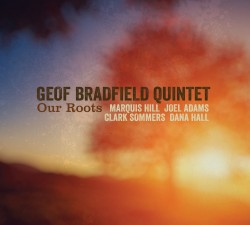MUSIC REVIEW BY Dan McClenaghan, All About Jazz
4 1/2 STARS Discussing "roots" in the context of jazz, a good starting point is the Mississippi delta, down in New Orleans, where the music of trumpeters King Oliver and Louis Armstrong grew strong. And then there's the rich earth of the delta in north western Mississippi, up near Clarksdale, where the blues grew and blossomed. The roots from both these areas were, of course, transplanted from Africa.
Chicago-based saxophonist Geof Bradfield follows up his marvelous Melba! (Origin Records, 2013) with Our Roots, drawing his inspiration from saxophonist Clifford Jordan's These Are My Roots: the Music of Lead Belly (Atlantic Records, 1965), a celebration of the music of blues man Huddie Ledbetter, taking the raw folk and blues stylings and turning it into a very legitimate and inspiring jazz outing. It was Geof Bradfield's self-imposed job, with his Our Roots, to bring a new perspective to an album he had long loved.
On Melba!, an examination of the sounds from trombonist arranger Melba Liston, pianist Randy Weston's arranger of choice for a good chunk of his career, Bradfield used a three horn front line with two chording instruments, piano and guitar, to explore the African-tinted textures of Liston's artistry. With Our Roots, he leaves the chords out, going with the three horns, bass and drums, a line-up that loosens things up and offers a purity and simplicity that fits Lead Belly's music well.
This isn't a note for note or song for song copy of Jordan's album. That 1965 outing was all Lead Belly. For Our Roots the saxophonist includes four of the Lead Belly tunes from the Clifford Jordan disc, throws in three of his originals in the spirit of Ledbetter's folk/blues, adds a couple of Texas blues man Willie Dixon's songs, and just for the hell of it (and they fit so well), a couple of Georgia Sea Island ring shouts. This is music that says America.
Spirited horn work, a killer bass drum team. There are times this sounds like a Randy Weston set, pared down to its essentials. Some of Melba Liston may have soaked into Bradfield's DNA. And the sax man at times has the fierce rawness of Dewey Redman or Pharoah Sanders, two of the tenorists who contributed so brilliantly to Weston's Melba Liston-arranged masterpiece, Spirits of Our Ancestors (Antilles Records, 1992).
These are proud sounds, sometimes raucous and rubbery, spiritual, occasionally brash, and consistently brimming with joy.
Chicago-based saxophonist Geof Bradfield follows up his marvelous Melba! (Origin Records, 2013) with Our Roots, drawing his inspiration from saxophonist Clifford Jordan's These Are My Roots: the Music of Lead Belly (Atlantic Records, 1965), a celebration of the music of blues man Huddie Ledbetter, taking the raw folk and blues stylings and turning it into a very legitimate and inspiring jazz outing. It was Geof Bradfield's self-imposed job, with his Our Roots, to bring a new perspective to an album he had long loved.
On Melba!, an examination of the sounds from trombonist arranger Melba Liston, pianist Randy Weston's arranger of choice for a good chunk of his career, Bradfield used a three horn front line with two chording instruments, piano and guitar, to explore the African-tinted textures of Liston's artistry. With Our Roots, he leaves the chords out, going with the three horns, bass and drums, a line-up that loosens things up and offers a purity and simplicity that fits Lead Belly's music well.
This isn't a note for note or song for song copy of Jordan's album. That 1965 outing was all Lead Belly. For Our Roots the saxophonist includes four of the Lead Belly tunes from the Clifford Jordan disc, throws in three of his originals in the spirit of Ledbetter's folk/blues, adds a couple of Texas blues man Willie Dixon's songs, and just for the hell of it (and they fit so well), a couple of Georgia Sea Island ring shouts. This is music that says America.
Spirited horn work, a killer bass drum team. There are times this sounds like a Randy Weston set, pared down to its essentials. Some of Melba Liston may have soaked into Bradfield's DNA. And the sax man at times has the fierce rawness of Dewey Redman or Pharoah Sanders, two of the tenorists who contributed so brilliantly to Weston's Melba Liston-arranged masterpiece, Spirits of Our Ancestors (Antilles Records, 1992).
These are proud sounds, sometimes raucous and rubbery, spiritual, occasionally brash, and consistently brimming with joy.
Soundclips
Other Reviews of
"Our Roots":
JAZZIZ by Bob Weinberg
Downbeat by Michael Jackson
Jazz History Online by Thomas Cunniffe
Bird is the Worm by Dave Sumner
Chicago Tribune by Howard Reich
WTJU - Richmond by Dave Rogers
South Bend Tribune by Howard Dukes
Chicago Reader by Peter Margasak
Downbeat by Peter Margasak
Downbeat by Brian Zimmerman
KUCI, Irvine, CA by Hobart Taylor
Midwest Record by Chris Spector
All About Jazz by Mark Corroto
